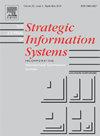认知计算在信息系统中的战略意义:通过知识相似度转换解决人工智能碎片化问题
IF 11.8
2区 管理学
Q1 COMPUTER SCIENCE, INFORMATION SYSTEMS
引用次数: 0
摘要
如果没有一个完整的人脑工作和处理信息的模型,人工智能(AI)将仍然是一个神秘的黑匣子,可能会随着环境的变化而走火。对三个认知计算组成部分(人工智能、认知心理学和神经生物学)的综合研究是创造可解释的人工智能发现的必要条件。本文介绍了认知计算系统(CCS)作为信息系统(IS)研究的一个领域。它通过开发一种新的计算方法——知识相似转换(KST)来回顾CCS概念的跨学科含义,以改进碎片化知识领域的数字增强文献分析。基于CCS和KST的双重贡献,本文从技术、心理和生理的角度概述了组织价值创造机会的战略含义和未来的研究方向。本文章由计算机程序翻译,如有差异,请以英文原文为准。
Strategic implications of cognitive computing in IS: addressing AI fragmentation through knowledge similarity transformation
Without an integrated model of how the human brain works and processes information, artificial intelligence (AI) will remain a mysterious black box that can misfire as circumstances change. An integrated study of the three cognitive computing components (AI, cognitive psychology, and neurobiology) is necessary to create explainable AI findings. This paper introduces cognitive computing systems (CCS) as a domain for information systems (IS) research. It reviews the interdisciplinary implications of CCS concepts by developing a new computational method, knowledge similarity transformation (KST), to improve digital-augmented literature analysis in fragmented knowledge areas. Based on the dual CCS and KST contribution, this article outlines strategic implications for organizational value creation opportunities and future research directions from a technological, psychological, and physiological perspective.
求助全文
通过发布文献求助,成功后即可免费获取论文全文。
去求助
来源期刊

Journal of Strategic Information Systems
工程技术-计算机:信息系统
CiteScore
17.40
自引率
4.30%
发文量
19
审稿时长
>12 weeks
期刊介绍:
The Journal of Strategic Information Systems focuses on the strategic management, business and organizational issues associated with the introduction and utilization of information systems, and considers these issues in a global context. The emphasis is on the incorporation of IT into organizations'' strategic thinking, strategy alignment, organizational arrangements and management of change issues.
 求助内容:
求助内容: 应助结果提醒方式:
应助结果提醒方式:


